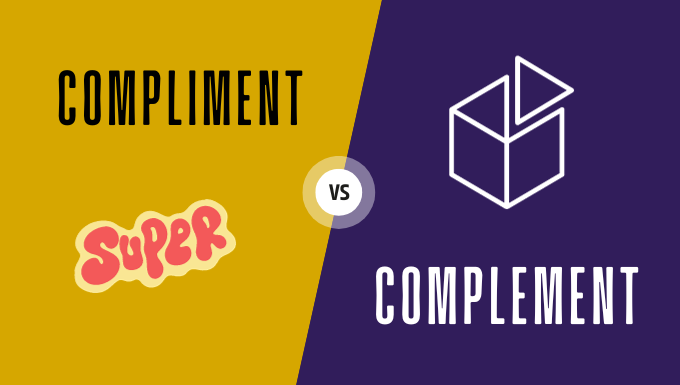
Table of Contents
Introduction
Have you ever found yourself pausing, wondering whether to write compliment or complement? You’re not alone! These two words sound alike but carry different meanings. In this post, we’ll break down the difference between ‘compliment’ and ‘complement’ in plain English, so you can use them confidently in your writing and conversations.
What is a Compliment?
A ‘compliment’ (with an ‘i’) is a kind or flattering remark.
For example:
- “I received a lovely compliment on my new dress.”
- “He complimented her on her expert presentation skills.”
Remember, when you compliment someone, you are praising them.
Understanding Complement
A ‘complement’ (with an ‘e’) is something that completes or enhances something else when paired with it.
For example:
- “This wine is the perfect complement to our cheese platter.”
- “Her skills complement those of her colleague, making them a great team.”
A good way to remember it is: ‘e’ in complement stands for ‘enhance’ or ‘complete’.
Easy Memory Tips
- Compliment with an ‘I’: Think of the ‘I’ as referring to ‘individual praise’.
- Complement with an ‘E’: The ‘E’ can remind you of ‘enhancement’ or ‘extension’.
Common Mistakes to Avoid
- Wrong: “Your shoes really compliment your outfit.”
- Right: “Your shoes really complement your outfit.”
- Wrong: “The sauce is a great compliment to the chicken.”
- Right: “The sauce is a great complement to the chicken.”
Examples of Compliment and Complement
Here are some examples to illustrate the difference between ‘compliment’ and ‘complement’:
Examples of ‘Compliment’ (with an ‘i’):
- In Personal Praise: “My boss gave me a compliment on my presentation skills during the meeting.”
- Admiring Appearance: “I received many compliments on my new haircut.”
- Appreciating Efforts: “The chef came out to compliment us on our choice of wine, which paired well with the meal.”
- Acknowledging Talent: “She complimented the musician for his exceptional performance.”
- On Social Media: “His latest post on environmental awareness has garnered numerous compliments from followers.”
Examples of ‘Complement’ (with an ‘e’):
- Enhancing Food Pairings: “This chutney complements the spicy chicken perfectly.”
- In Fashion: “Her scarf complements her dress beautifully.”
- Work Skills: “His attention to detail complements her creative thinking in their project team.”
- Decor: “The vibrant cushions on the sofa complement the room’s neutral color scheme.”
- In Relationships: “They have different personalities that complement each other, making them a great couple.”
These examples demonstrate how ‘compliment’ is used when offering praise or admiration, while ‘complement’ refers to something that enhances or completes another thing.
Conclusion
Now that you know the difference, you can confidently use compliment and complement in your daily communication. Remember, a ‘compliment’ is a praise, and a ‘complement’ is about completing something. Go ahead and sprinkle these words into your conversations and writings accurately!
Engage with Us!
Did you find this explanation helpful? Do you have any tricks to remember the difference? Share your thoughts and examples in the comments below!
Compliment vs Complement FAQs
FAQ 1: What is the difference between compliment and complement?
- Answer: The difference lies in their meanings. A ‘compliment‘ (with an ‘i’) is a praise or a positive remark made about someone or something. For example, “She received a compliment on her eloquent speech.” On the other hand, a ‘complement’ (with an ‘e’) refers to something that completes or enhances another thing when paired with it. For example, “Her skills complement the team’s abilities perfectly.”
FAQ 2: Can ‘compliment’ and ‘complement’ be used interchangeably?
- Answer: No, they cannot be used interchangeably as they have distinct meanings. ‘Compliment’ is used when referring to expressions of praise or admiration, whereas ‘complement’ is used when something adds to or enhances something else. Using one in place of the other can change the meaning of a sentence.
FAQ 3: How can I remember the difference between compliment and complement?
- Answer: A simple trick to remember the difference is to focus on the ‘I’ and ‘E’. The ‘I’ in ‘compliment’ stands for ‘individual praise’ – something you would give to a person. The ‘E’ in ‘complement’ relates to ‘enhancement’ or ‘extension’ – something that adds to or goes well with something else. This mnemonic can help you recall which word to use in different contexts.